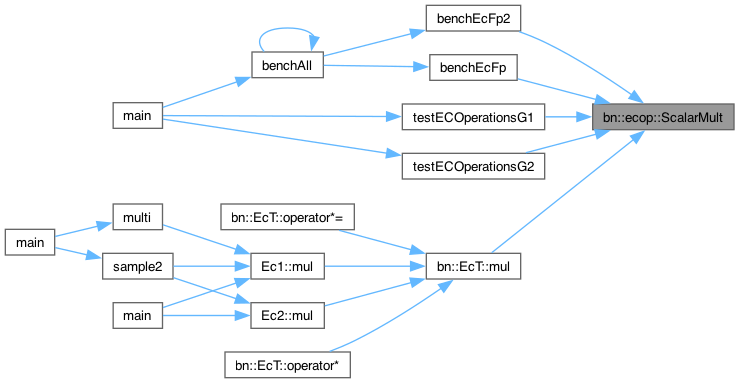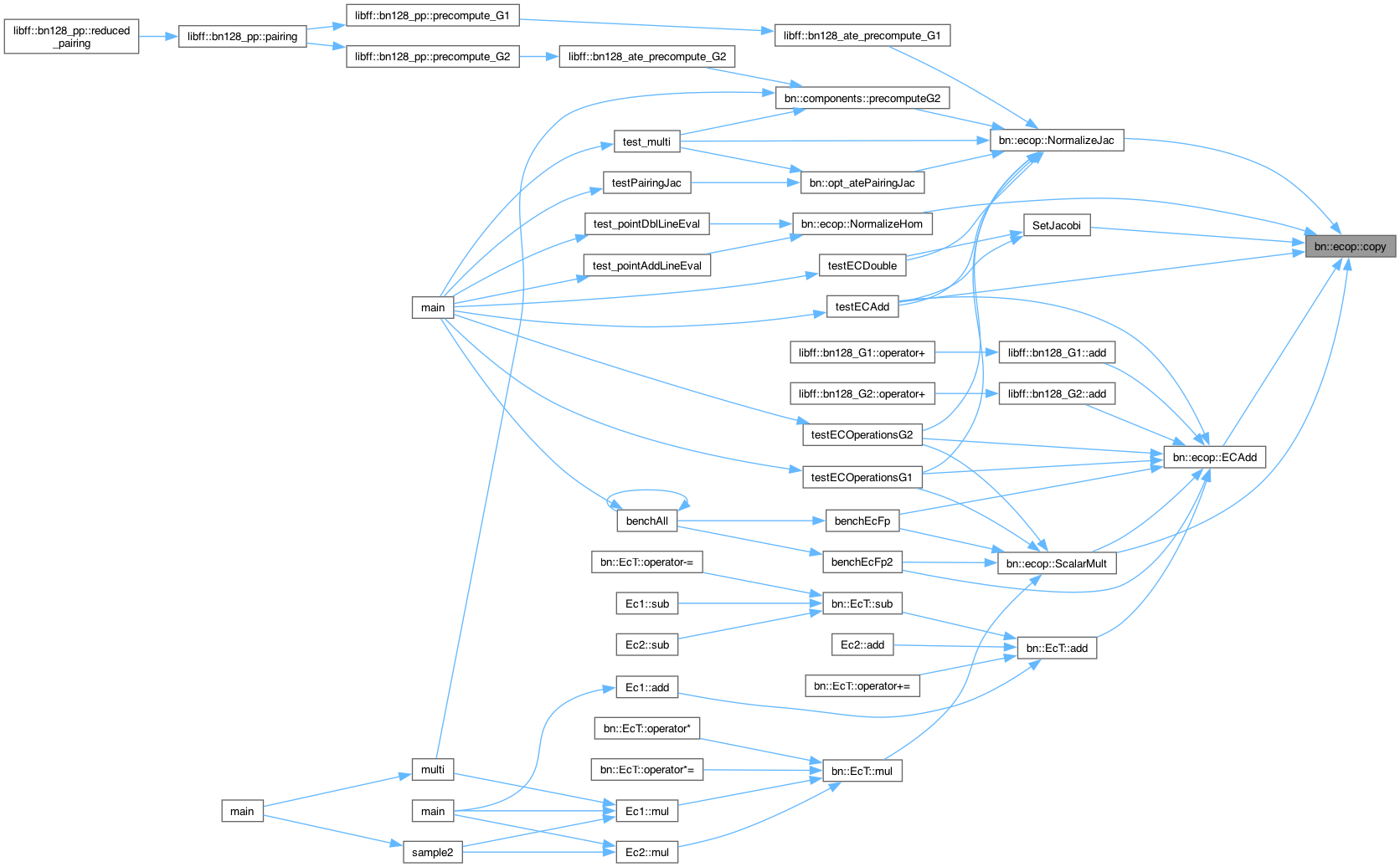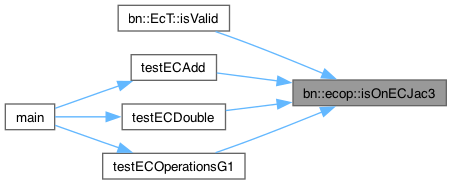Loading...
Searching...
No Matches
bn::ecop Namespace Reference
Functions | |
| template<class FF > | |
| void | copy (FF *out, const FF *in) |
| template<class Fp > | |
| bool | isOnECJac3 (const Fp *P) |
| template<class Fp > | |
| bool | isOnECHom2 (const Fp *P) |
| template<class Fp > | |
| bool | isOnECHom3 (const Fp *P) |
| template<class Fp > | |
| bool | isOnTwistECJac3 (const Fp2T< Fp > *P) |
| template<class Fp > | |
| bool | isOnTwistECHom2 (const Fp2T< Fp > *P) |
| template<class Fp > | |
| bool | isOnTwistECHom3 (const Fp2T< Fp > *P) |
| template<class FF > | |
| void | NormalizeJac (FF *out, const FF *in) |
| template<class FF > | |
| void | NormalizeHom (FF *out, const FF *in) |
| template<class FF > | |
| void | ECDouble (FF *out, const FF *in) |
| template<class FF > | |
| void | ECAdd (FF *out, const FF *a, const FF *b) |
| template<class FF , class INT > | |
| void | ScalarMult (FF *out, const FF *in, const INT &m) |
| template<class Fp > | |
| void | FrobEndOnTwist_1 (Fp2T< Fp > *Q, const Fp2T< Fp > *P) |
| template<class Fp > | |
| void | FrobEndOnTwist_2 (Fp2T< Fp > *Q, const Fp2T< Fp > *P) |
| template<class Fp > | |
| void | FrobEndOnTwist_8 (Fp2T< Fp > *Q, const Fp2T< Fp > *P) |
Function Documentation
◆ copy()
template<class FF >
|
inline |
◆ ECAdd()
template<class FF >
|
inline |
Definition at line 2526 of file bn.h.
2527{
2529 copy(out, b);
2530 return;
2531 }
2532 if (b[2].isZero()) {
2533 copy(out, a);
2534 return;
2535 }
2537 FF t6, t7, t8, t9, t10, t11, t12, t13, t14;
2538 FF::square(Z1Z1, a[2]);
2539 FF::square(Z2Z2, b[2]);
2540 FF::mul(U1, a[0], Z2Z2);
2541 FF::mul(U2, b[0], Z1Z1);
2542 FF::mul(t0, b[2], Z2Z2);
2543 FF::mul(S1, a[1], t0);
2544 FF::mul(t1, a[2], Z1Z1);
2545 FF::mul(S2, b[1], t1);
2546 FF::sub(H, U2, U1);
2547 FF::sub(t3, S2, S1);
2548
2549 if (H.isZero()) {
2550 if (t3.isZero()) {
2551 ECDouble(out, a);
2552 } else {
2553 out[2].clear();
2554 }
2555 return;
2556 }
2557
2558 FF::add(t2, H, H);
2559 FF::square(I, t2);
2560 FF::mul(J, H, I);
2561 FF::add(r, t3, t3);
2562 FF::mul(V, U1, I);
2563 FF::square(t4, r);
2565 FF::sub(t6, t4, J);
2566 FF::sub(out[0], t6, t5);
2567 FF::sub(t7, V, out[0]);
2568 FF::mul(t8, S1, J);
2569 FF::add(t9, t8, t8);
2570 FF::mul(t10, r, t7);
2571 FF::sub(out[1], t10, t9);
2572 FF::add(t11, a[2], b[2]);
2573 FF::square(t12, t11);
2574 FF::sub(t13, t12, Z1Z1);
2575 FF::sub(t14, t13, Z2Z2);
2576 FF::mul(out[2], t14, H);
2577}
Definition test_zm.cpp:19
Here is the call graph for this function:

Here is the caller graph for this function:
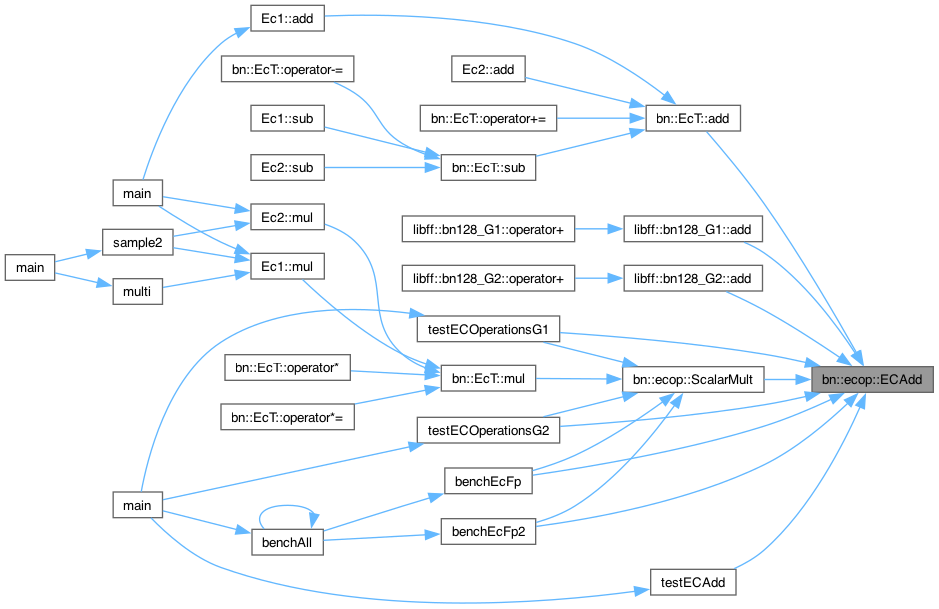
◆ ECDouble()
template<class FF >
|
inline |
Definition at line 2497 of file bn.h.
2498{
2500 FF::square(A, in[0]);
2501 FF::square(B, in[1]);
2502 FF::square(C, B);
2503 FF::add(t0, in[0], B);
2504 FF::square(t1, t0);
2505 FF::sub(t2, t1, A);
2506 FF::sub(t3, t2, C);
2507 FF::add(D, t3, t3);
2509 FF::add(E, E, A);
2510 FF::square(F, E);
2512 FF::sub(out[0], F, t4);
2513 FF::sub(t5, D, out[0]);
2514 t6 = C; t6 += t6; t6 += t6; t6 += t6; // t6 = 8*C
2515 FF::mul(t7, E, t5);
2516 FF::mul(t8, in[1], in[2]);
2517 FF::sub(out[1], t7, t6);
2518 FF::add(out[2], t8, t8);
2519}
Definition Tricky.tests.cpp:102
Definition Tricky.tests.cpp:113
#define A
Here is the caller graph for this function:
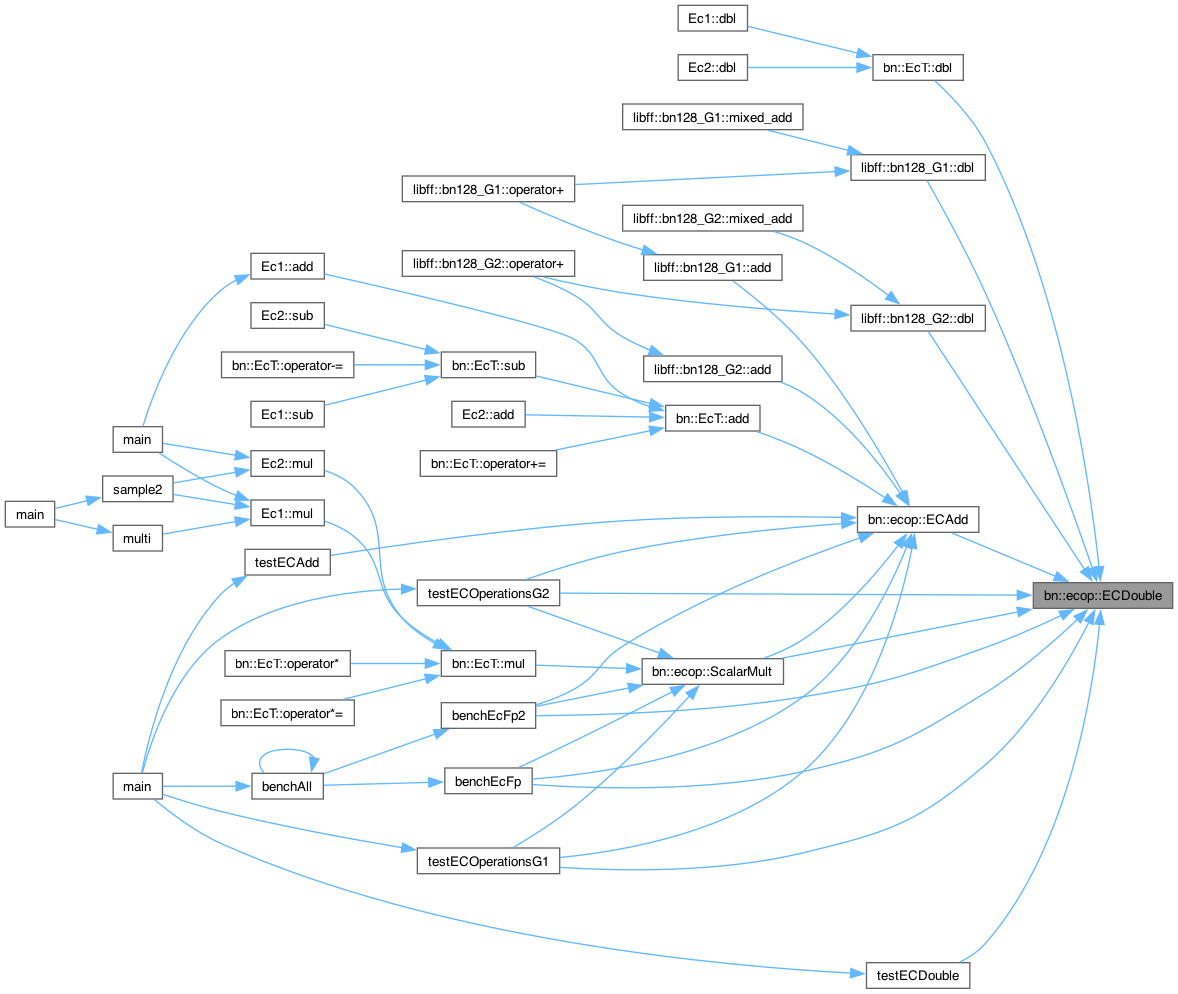
◆ FrobEndOnTwist_1()
Definition at line 2650 of file bn.h.
2651{
2654 // applying Q[0] <- P[0]^q
2655#ifdef BN_SUPPORT_SNARK
2657 Fp::neg(Q[0].b_, P[0].b_);
2658
2659 // Q[0] *= xi^((p-1)/3)
2660 Q[0] *= Param::gammar[1];
2661
2662 // applying Q[1] <- P[1]^q
2664 Fp::neg(Q[1].b_, P[1].b_);
2665
2666 // Q[1] *= xi^((p-1)/2)
2667 Q[1] *= Param::gammar[2];
2668#else
2670 Fp::neg(Q[0].b_, P[0].b_);
2671 Fp2::mul_Fp_1(Q[0], Param::W2p.b_);
2673 Fp::neg(Q[1].b_, P[1].b_);
2674 Q[1] *= Param::W3p;
2675#endif
2676}
Definition bn.h:179
Here is the call graph for this function:

Here is the caller graph for this function:

◆ FrobEndOnTwist_2()
Definition at line 2679 of file bn.h.
2680{
2681#ifdef BN_SUPPORT_SNARK
2682 Fp2T<Fp> scratch[2];
2684 FrobEndOnTwist_1(Q, scratch);
2685#else
2688 Fp2::mul_Fp_0(Q[0], P[0], Param::Z);
2689 Fp2::neg(Q[1], P[1]);
2690#endif
2691}
void FrobEndOnTwist_1(Fp2T< Fp > *Q, const Fp2T< Fp > *P)
Definition bn.h:2650
Here is the call graph for this function:

Here is the caller graph for this function:

◆ FrobEndOnTwist_8()
Definition at line 2694 of file bn.h.
2695{
2696#ifdef BN_SUPPORT_SNARK
2697 Fp2T<Fp> scratch2[2], scratch4[2], scratch6[2];
2699 FrobEndOnTwist_2(scratch4, scratch2);
2700 FrobEndOnTwist_2(scratch6, scratch4);
2701 FrobEndOnTwist_2(Q, scratch6);
2702#else
2705 Fp2::mul_Fp_0(Q[0], P[0], Param::Z);
2706 Q[1] = P[1];
2707#endif
2708}
void FrobEndOnTwist_2(Fp2T< Fp > *Q, const Fp2T< Fp > *P)
Definition bn.h:2679
Here is the call graph for this function:

Here is the caller graph for this function:

◆ isOnECHom2()
◆ isOnECHom3()
◆ isOnECJac3()
◆ isOnTwistECHom2()
◆ isOnTwistECHom3()
◆ isOnTwistECJac3()
◆ NormalizeHom()
template<class FF >
|
inline |
Definition at line 2475 of file bn.h.
2476{
2477 if (in[2] == 0) {
2478 out[0].clear();
2479 out[1].clear();
2480 out[2].clear();
2481 } else if (in[2] == 1) {
2482 copy(out, in);
2483 } else {
2484 FF A = in[2];
2485 A.inverse();
2486 FF::mul(out[0], in[0], A);
2487 FF::mul(out[1], in[1], A);
2488 out[2] = 1;
2489 }
2490}
Here is the call graph for this function:

Here is the caller graph for this function:

◆ NormalizeJac()
template<class FF >
|
inline |
Definition at line 2451 of file bn.h.
2452{
2453 if (in[2] == 0) {
2454 out[0].clear();
2455 out[1].clear();
2456 out[2].clear();
2457 } else if (in[2] == 1) {
2458 copy(out, in);
2459 } else {
2460 FF A, AA, t0;
2461 A = in[2];
2462 A.inverse();
2463 FF::square(AA, A);
2464 FF::mul(out[0], in[0], AA);
2465 FF::mul(t0, AA, A);
2466 FF::mul(out[1], in[1], t0);
2467 out[2] = 1;
2468 }
2469}
Here is the call graph for this function:

Here is the caller graph for this function:

◆ ScalarMult()
|
inline |
Definition at line 2590 of file bn.h.
2591{
2593 typedef typename Tag::value_type value_type;
2594
2595 if (m == 0) {
2596 out[0].clear();
2597 out[1].clear();
2598 out[2].clear();
2599 return;
2600 }
2601 FF inCopy[3];
2602 if (out == in) {
2603 ecop::copy(inCopy, in);
2604 in = inCopy;
2605 }
2606
2607 const int mSize = (int)Tag::getBlockSize(m);
2608 const int vSize = (int)sizeof(value_type) * 8;
2609 const value_type mask = value_type(1) << (vSize - 1);
2610 assert(mSize > 0); // if mSize == 0, it had been returned.
2611 /*
2612 Extract and process for MSB of most significant word.
2613 */
2614 value_type v = Tag::getBlock(m, mSize - 1);
2616
2617 while ((v != 0) && (!(v & mask))) {
2618 v <<= 1;
2619 ++j;
2620 }
2621
2622 v <<= 1;
2623 ++j;
2624 ecop::copy(out, in);
2625 /*
2626 Process for most significant word.
2627 */
2629 ECDouble(out, out);
2630 if (v & mask) {
2631 ECAdd(out, out, in);
2632 }
2633 }
2634
2635 /*
2636 Process for non most significant words.
2637 */
2638 for (int i = mSize - 2; i >= 0; --i) {
2639 v = Tag::getBlock(m, i);
2641 ECDouble(out, out);
2642 if (v & mask) {
2643 ECAdd(out, out, in);
2644 }
2645 }
2646 }
2647}
Definition zm.h:1346
Here is the call graph for this function:

Here is the caller graph for this function:
